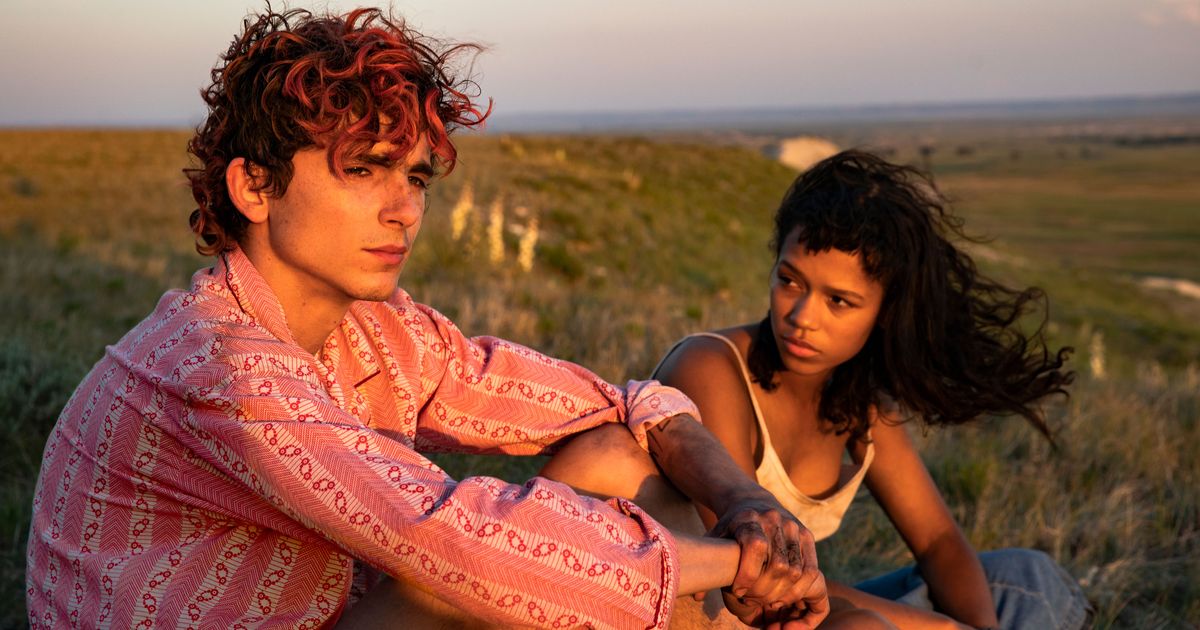
Bones and All Is Curiously Bloodless
In the cannibal road-movie romance Bones and All, the characters’ central affliction is treated not merely as a carnivorous biological need (a hereditary one, no less) but also as a kind of shared language, a spiritual and social bond. Cannibals can smell each other, we’re told, and the more experienced ones can sniff out their fellow human flesh-eaters from miles away. As such, one is tempted to read cannibalism in this film as a metaphor of some sort, though it really could represent just about anything. And the whole monstrous-conditions-as-metaphors-for-forbidden-desire thing became rather passé years ago. Director Luca Guadagnino wisely makes sure not to play things too coyly or abstractly. He really gets into the cannibalism itself, into the blood and the gore and the bits of flesh hanging off people’s mouths. He might have had his high-minded reasons for making the movie, but he clearly enjoys just plain grossing us out, too.
So at least there’s that. The pleasures of Bones and All wind up being incidental and, sadly, fleeting — an effectively grisly scene here, an arresting performance there. The film, as a whole, never quite hangs together, because even as it goes through the motions of both the road movie and the romance, it never really finds an animating energy to drive it along. It wants to move us, but it feels cold and empty — curiously bloodless, despite all the, you know, blood.
Part of the problem might be the lack of chemistry between its two stars. That’s not to say that they’re not talented. As the protagonist, Maren Yearly, who finds herself on her own after her dad leaves on her 18th birthday, Taylor Russell brings just the right feral inquisitiveness, with eyes that see right through you and a hungry lean that hints at the predator beneath; her posture, we imagine, might be the same whether she’s tearing into a body or looking for self-knowledge.
However, as Lee, a Kentucky drifter with whom Maren soon falls in love, Timothée Chalamet seems unable to muster anything resembling passion. To be fair, part of that is probably by design: Another cannibal (played by a very game Michael Stuhlbarg) suggests that Lee is holding his urges back, that he’s trying to maintain a sense of control over his chaotic reality. The still-innocent Maren has all sorts of questions about their condition, and the standoffish Lee doesn’t seem eager to answer them. But Chalamet’s performance doesn’t convey any of this inner conflict; there’s no tension behind the eyes. All we’re left with is a nice man with big hair and extravagantly torn jeans struggling with a country-boy accent.
Could it be the filmmaking? The actor certainly has proven his range and skill in previous films, including Guadagnino’s own masterpiece, Call Me by Your Name. But this time out, he’s directed more like a movie star than an actor — a presence instead of a person. It feels like exactly the wrong choice for this particular performer. It prevents the movie from having any kind of pulse.
Guadagnino has also surrounded his young lovers with a host of bizarre, over-the-top performances that heighten the alien nature of this world. Chief among them is Mark Rylance, playing an eccentric, nomadic cannibal named Sully who gives Maren an early lesson in how to feed herself, but whose motives remain delectably mysterious. Rylance can turn a meek murmur into a menacing glare at a moment’s notice. You want to giggle at his performance, but it’s a nervous giggle — yes, the character is ridiculous, but also, we really, truly don’t know what he will do next. Chloë Sevigny briefly shows up late in the film for one quiet, scarring scene. These performances are presumably there to provide a contrast with the stability and peace our protagonists seek, but they also inadvertently keep reminding us of the far more compelling movie Bones and All could have been.
The director tries to fill in the empty spaces where emotional engagement should be with some nice photography and a deluge of music, much of it consisting of an insistently twangy, sub-Sundance faux-folk score that, shockingly, is credited to Trent Reznor and Atticus Ross. The approach might have worked, once. Wim Wenders used to make movies like this in his sleep. But those classic road movies worked because that director (and others who delved into the genre, such as Terrence Malick and Gus Van Sant) clearly shared a fascination with — and even love for — the land and the people along the way. It’s hard to sense any similar affection or interest in this world on Guadagnino’s part. The whole film, for all its gore and talk of animalistic abandon, feels like a dutiful, skin-deep pastiche.































![iFi's GO Bar Kensei Dongle DAC Supports K2HD Technology With Some Samurai Swagger [Updated] iFi's GO Bar Kensei Dongle DAC Supports K2HD Technology With Some Samurai Swagger [Updated]](https://i0.wp.com/cdn.ecoustics.com/db0/wblob/17BA35E873D594/33FF/45A11/QTXOLJR4xDKSNMMk2WlTgjaIlvSgcYpeU1xJzUwIoYs/ifi-go-bar-kensei.jpg?w=768&ssl=1)
























